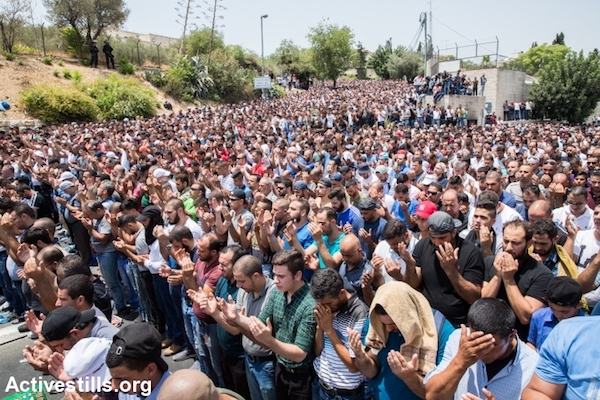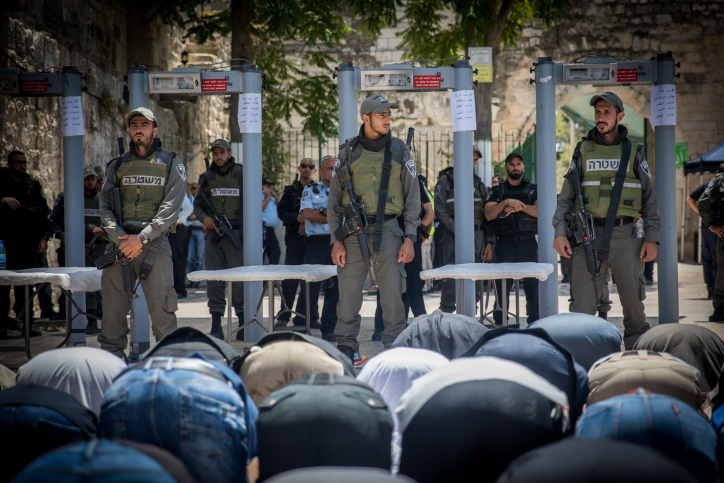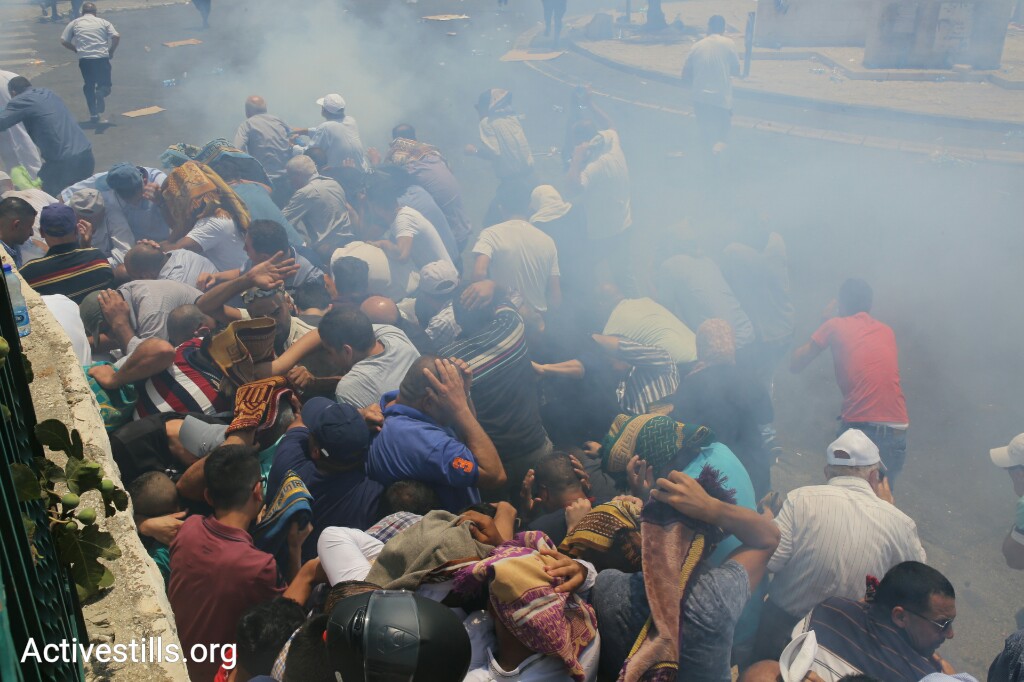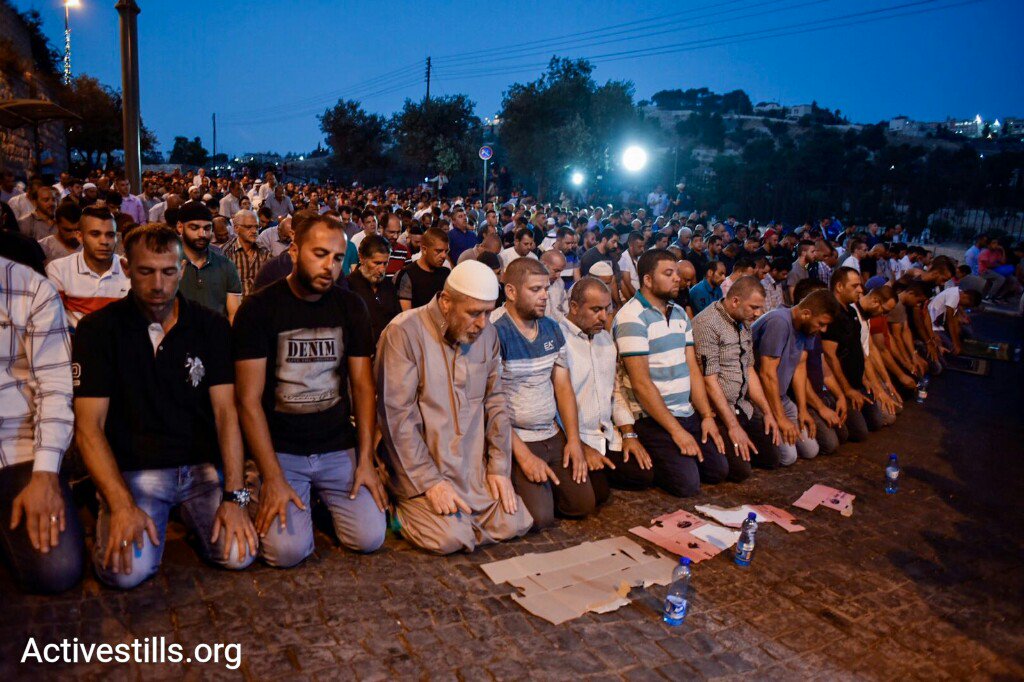How the World Missed a Week of Palestinian Civil Disobedience
NONVIOLENCE, PALESTINE - ISRAEL, 31 Jul 2017
The violence of the past week, and the media’s coverage of the bloodletting, erased a central aspect of the story: Palestinian mass civil disobedience.

Palestinian worshipers hold a mass prayer in the streets of East Jerusalem as an act of civil disobedience after Israel implemented new entry arrangements for Al-Aqsa Mosque, Wadi Joz, East Jerusalem, July 21, 2017. (Yotam Ronen/Activestills.org)
24 Jul 2017 – For many Israelis, the violence over the past few weeks around the Temple Mount/Haram al-Sharif is little more than a result of Muslim intransigence in the face of legitimate Israeli security concerns. This, after all, has been the major talking point among both the Israeli leadership as well as the media. For Palestinians, on the other hand, the metal detectors erected last week by Israeli authorities at the entrance to the Al-Aqsa compound sparked outrage and protests.
That outrage stemmed from the government’s decision to install the metal detectors — in defiance of both the IDF and the Shin Bet’s recommendation — that eventually led to the deaths of four Palestinian protesters at the hands of Israeli security forces, and the brutal murder of three Israeli settlers by a Palestinian attacker that same night. But the violence, and the media’s coverage of the bloodletting, erased a central aspect of the story: Palestinian civil disobedience.
“We need to understand that there has been a major, continuous nonviolent protest taking place in East Jerusalem for over a week,” says Aviv Tatarsky, a field researcher for Ir Amim, a Jerusalem-based NGO that works to build a more equitable city for all its residents. “The decision to boycott the metal detectors and refrain from going up to Al-Aqsa, the continuous stream of people to the gates of the compound, the mass prayers, all of these are a form of civil disobedience. And as such, it is a legitimate form of protest — whether or not we agree with it.”
“For Israelis, framing the protests in East Jerusalem as ‘nonviolent’ is at best strange and at worst scandalous, since the metal detectors were installed following the killing of Border Police officers at the site two weeks ago, and because three Israelis were murdered just a few days ago,” Tatarsky continues. “But in order to understand the nonviolence of the protests, the Israeli public will have to differentiate between the actions of individuals — who aren’t even from East Jerusalem — and the mass protest movement that includes most parts of Palestinian civil society in Jerusalem.”

Palestinian worshippers pray at Lions’ Gate at the entrance to Al-Aqsa compound. Metal detectors were placed outside the site by Israeli authorities following an attack by Palestinian citizens of Israel on Israeli security forces, July 16, 2017. (Yonatan Sindel/Flash90)
+972 Magazine spoke to Tatarsky about the delicate status quo at the Temple Mount, the possibility of bringing an end to the violence, and the media’s unwillingness to cover Palestinian nonviolence.
What do the events of the past week look like from the Palestinian side?
Every Palestinian knows what it feels like when Israeli security measures restrict their freedoms and violate their rights — often for no reason. From random checks in the middle of the street to checkpoints to shutting down entire neighborhoods. The metal detectors were installed after two days in which Palestinians were barred from entering the Old City, all while Jews and tourists were free to enter and exit. Most Israelis cannot comprehend that what they view as legitimate “security measures” is in the eyes of Palestinians a form of collective punishment.

Israeli forces fire tear gas at Palestinian worshippers in Ras al-Amud, East Jerusalem, July 21, 2017. (Oren Ziv/Activestills.org)
Remember that it is easy for violence to break out in a tense situation in which Israeli armed forces are standing face-to-face with angry Palestinian protesters. Sometimes it is the police who are the ones who initiate the violence, other times it is the demonstrators. Regardless, a central component of the protests was practicing nonviolence on a daily basis, all while bravely standing up to armed security forces that could use violence at any point.
What is this ‘status quo’ that we keep hearing so much about?
Since 1967, the Waqf has been in charge of overseeing entry to the Temple Mount/Haram al-Sharif. The metal detectors manned by Israeli security personnel takes that authority away from the Waqf, which is effectively a change in the status quo. Until 2000, when the Second Intifada broke out, the Waqf decided who could or couldn’t enter the Temple Mount/Haram al-Sharif.
In 2003, when Israel began re-allowing non-Muslim access to the site, after it was halted with the eruption of the Intifada, it took away the Waqf’s authority over the Mughrabi Gate, through which non-Muslims enter the site.
Since then, and especially since the rise in clashes between security forces and Palestinians over the past few years — usually as a response to Jews ascending the Mount — members of the Waqf have repeatedly demanded that the authority be returned to them, even going so far as to propose alleviating entry conditions for Jews. With the metal detectors, the Waqf believes the police have further stifled its control over the entry to the Mount.
Why didn’t the Israeli public pay attention to the nonviolent protests?
I believe it has to do with the fact that the Israeli media totally missed the nonviolent aspect of the protests. One can assume that Israeli journalists suffer from the same prejudice as the rest of the public: they are so sure that Palestinian resistance automatically means violence, that they are unable to identify other expressions of it.
Let’s not forget that the media played a role in this crisis. Yes, the Israeli government is the one that made the wrong decision to put up the metal detectors, and thus is responsible for refusing to remove them. But when politicians act irresponsibly, the public has the right to demand that they change their decisions. Had the Israeli public been told about the nonviolent aspects of the protest, some segments of the population would have understood that civil disobedience is a legitimate way to make political demands. In a situation of nonviolent protest, negotiations with the representatives of the protesters is a desired outcome.

Palestinians hold a mass evening prayer adjacent to Jerusalem’s Old City, July 23, 2017.
(Activestills.org)
However, removing the metal detectors as a result of a violent struggle is akin to “capitulating to terror.” In this scenario, there was simply no possibility for the Jewish Israeli public to put pressure on the government to remove the metal detectors.
What is the status of the nonviolent demonstrations now?
The majority of Palestinians in East Jerusalem are maintaining restraint. Despite the violent clashes, the mass nonviolent prayers continue to be one of the central components of the protest. It could very well be that even now, finding a solution to the metal detectors will bring about calm and a halt to the violence.
Is that even feasible at this point?
It’s hard to suggest such a solution. Regardless of our opinion on the best possible outcome, it is easy to see that the two sides will find it difficult to agree to an arrangement that portrays them as the loser in this round. On the other hand, as long as the two sides double down, the crisis may continue and escalate.
The bottom line, however, is this: Israel cannot unilaterally make decisions about entry to the Temple Mount/Haram al-Sharif. Coordination with the Waqf is necessary since it both protects the rights of Muslim worshippers and because of the legitimacy it grants the Waqf among the Muslim public. Coordination also means recognizing the Waqf’s authority at the Temple Mount/Haram al-Sharif.
The violence in Jerusalem over the past few years is an expression of the weakness of the leadership in East Jerusalem, which still holds sway over much of the Palestinian public in the city, and with the Israeli authorities could have held a dialogue. Israel pays a price for this weakness every time a crisis arises. The current crisis is leading to a new, popular leadership in East Jerusalem. If Israel understands that it must be in dialogue with it, the crisis may yet let to a positive change in the city.
_________________________________________
Related stories:
- Why the metal detectors at Al-Aqsa are such a big deal By Noa Levy | July 23, 2017
- Senior Israeli gov’t minister warns Palestinians of ‘third Nakba’ By Michael Schaeffer Omer-Man | July 24, 2017
- Six things that must be said about the violence in Jerusalem and West Bank By Haggai Matar | July 23, 2017
- Is Abbas serious about freezing security coordination with Israel? By Menachem Klein | July 23, 2017
 Edo Konrad is a writer, blogger, and translator based in Tel Aviv. He previously worked as an editor for Haaretz, and is currently the deputy editor of +972 Magazine.
Edo Konrad is a writer, blogger, and translator based in Tel Aviv. He previously worked as an editor for Haaretz, and is currently the deputy editor of +972 Magazine.
Join the BDS-BOYCOTT, DIVESTMENT, SANCTIONS campaign to protest the Israeli barbaric siege of Gaza, illegal occupation of the Palestine nation’s territory, the apartheid wall, its inhuman and degrading treatment of the Palestinian people, and the more than 7,000 Palestinian men, women, elderly and children arbitrarily locked up in Israeli prisons.
DON’T BUY PRODUCTS WHOSE BARCODE STARTS WITH 729, which indicates that it is produced in Israel. DO YOUR PART! MAKE A DIFFERENCE!
7 2 9: BOYCOTT FOR JUSTICE!
DISCLAIMER: The statements, views and opinions expressed in pieces republished here are solely those of the authors and do not necessarily represent those of TMS. In accordance with title 17 U.S.C. section 107, this material is distributed without profit to those who have expressed a prior interest in receiving the included information for research and educational purposes. TMS has no affiliation whatsoever with the originator of this article nor is TMS endorsed or sponsored by the originator. “GO TO ORIGINAL” links are provided as a convenience to our readers and allow for verification of authenticity. However, as originating pages are often updated by their originating host sites, the versions posted may not match the versions our readers view when clicking the “GO TO ORIGINAL” links. This site contains copyrighted material the use of which has not always been specifically authorized by the copyright owner. We are making such material available in our efforts to advance understanding of environmental, political, human rights, economic, democracy, scientific, and social justice issues, etc. We believe this constitutes a ‘fair use’ of any such copyrighted material as provided for in section 107 of the US Copyright Law. In accordance with Title 17 U.S.C. Section 107, the material on this site is distributed without profit to those who have expressed a prior interest in receiving the included information for research and educational purposes. For more information go to: http://www.law.cornell.edu/uscode/17/107.shtml. If you wish to use copyrighted material from this site for purposes of your own that go beyond ‘fair use’, you must obtain permission from the copyright owner.
Read more
Click here to go to the current weekly digest or pick another article:
NONVIOLENCE:
- Understanding and Countering Agent Provocateurs in Nonviolent Movements
- Town Hall Violence and a (Hypothetical) Nonviolent Response
- Can Nonviolent Struggle Defeat a Dictator? This Database Emphatically Says Yes
PALESTINE - ISRAEL: